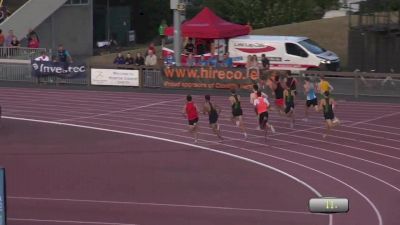Beatrice Chepkoech's World Record Tops Four Days Of Insane Track And Field
Beatrice Chepkoech's World Record Tops Four Days Of Insane Track And Field
American records, a world record, historically deep races. It all happened over this past weekend.

To quote a cinematic classic, “Boy, that escalated quickly.”
What was a standard off-year got jolted to life over the past four days with American records, a world record, historically deep races, and performances that haven’t been seen in over five years.
Yes, the times were fast, but it was more about the manner in which they were achieved.
Beatrice Chepkoech didn’t just break the steeplechase world record, she beat it by eight seconds—leaving the old mark somewhere in that vast expanse between herself and the rest of the field in Monaco on Friday.
The men’s 800m had two men run faster than anyone since that famous London Olympic final. The women’s 400m turned the clock all the way back to 2009 and provided a race that went down to the final strides.
This weekend will also be remembered for the reemergence of names like Shelly-Ann Fraser-Pryce and Clayton Murphy, as well as for the continued ascendance of Shelby Houlihan. It was spectacular, managing to squeeze everything out of 2018 while setting the stage perfectly for 2019. If we get no more professional track this year (which we will, don’t worry), it will have been worth it for what we saw in Monaco, London, and, yes, Heusden.
The outburst of this weekend will in all likelihood be the high point of 2018. Even in championship years, Monaco has become the de facto one-day world championships. It’s even more pronounced in dead years, where athletes are unencumbered by a championship to prep for and will just race.
The highlights were many, but there were a few themes that did emerge.
U.S. Women’s Distance Went Bonkers
There were two American records, a near miss on another, and numerous lifetime bests for the U.S. women this weekend.
On Friday, Courtney Frerichs ran 9:00.85 in the steeplechase, beating Emma Coburn for the first time in 12 attempts in the event and getting Coburn’s record in the process.
With Beatrice Chepkoech so far out in front, it was hard to track the rest of the field. Frerichs rarely made an appearance on camera, only popping up in the briefest of cutaways. But with Chepkoech running that fast, you knew second place would be quick as well.
Could we have predicted nine seconds flat? That’s a different question entirely. After Frerichs cut 17 seconds off her personal best to run 9:03.77 and get silver at the 2017 World Championships, there were plenty of reasons to think that 9:03 would be the fastest she’d ever run.
Seventeen-second personal bests don’t happen that often at his level, even for someone as young as Frerichs. That assumption was proven incorrect on Friday. Not just by Frerichs, but by Chepkoech as well, who ran 15 seconds better than her lifetime best.
Frerichs herself found three more seconds, but the breakthrough was more about who she beat than the time she ran. Of course, snapping the losing streak to Coburn was huge but she also took down four of the best women in history.
Yet just as Frerichs made a leap forward, the event as a whole launched itself to a whole new stratosphere on Friday. It’s of course too soon to know if 8:44 will become the new normal in the event or if Chepkoech’s run will be a one-off. Some records have a magnetic property, serving as a marker that pulls everyone along. Others remain as an outlier, much like Ruth Jebet’s 8:52 was until Friday (it’s important to note that on Friday the Athletics Integrity Unit announced that Jebet is facing a disciplinary hearing for doping).
Shelby Houlihan’s American record was a bit more predictable. She hasn’t been touched this outdoor season and has shown the ability to run fast in tactical and Diamond League settings. Saturday in Heusden was a pure time trial.
Shalane Flanagan paced Houlihan for the first two miles before Houlihan closed it out, running 14:34.45 to finish 27 seconds ahead of second-place Molly Huddle.
At this point, it would be more surprising if Houlihan didn’t get the 1500m American record this year. That mark, like the 5000m, is held by Shannon Rowbury and is barely a second faster than Houlihan’s personal best from Lausanne.
Behind Houlihan and Huddle, Karissa Schweizer ran a huge personal best in her Bowerman Track Club debut, 15:02.44, while Marielle Hall and Vanessa Fraser ran 15:08.20 and 15:09.62, respectively.
In London, Jenny Simpson almost made in three American records on the weekend. She ran 4:17.30 in the mile, just 0.59 off the record and good enough for second fastest of all time. Sifan Hassan won the race in 4:14.71, good for number three all-time.
Even the mascot was tired after this one! Full Mile at #londonDL in 4:17.3 for fourth. Huge PR but still a lot of season left. More work and more races on deck! #teamNB #mile pic.twitter.com/te2l1Q0tJv
— Jenny Simpson (@trackjenny) July 22, 2018
For the American women, the personal bests kept coming in the 800m. Ce’Aira Brown won the London Diamond League in 1:58.57, continuing her breakthrough season. It was also the biggest victory of her career. Raevyn Rogers got her second personal best of the summer, a 1:57.69 in Monaco. That race, won by Caster Semenya in the sixth-fastest time ever, showed historic depth. Five women broke 1:57 and seven ran quicker than 1:58.
Someone Lit A Fire Under The Men’s 800m
Nijel Amos rode the hot pace in Monaco and came out with a 1:42.14—the fastest time in the world since 2012. But that distinction didn’t last through the weekend. Emmanuel Korir went 1:42.05 in London, a personal best and a validation of all the lofty projections made about him.
Beginning in 2010, David Rudisha spoiled the rarity that is a 1:42. He pumped them out with such regularity that it was easy to forget that they aren’t typical.
Amos’ race was an homage to a time six years ago, not just for the event as a whole, but for Amos himself. The London Olympic final was the only time Amos had run faster and he hadn’t gone under 1:43 since 2015.
If his performance reminded everyone what he once did, Korir’s marked what could be. He hasn’t had that key moment on the international stage yet, but he’s undefeated on the year and shows a talent in the 400m and 800m that nobody currently can match. If you're looking at the next person to break 1:42, Korir looks like the guy.
Beyond those two, here’s what else happened in the men’s 800m
-Clayton Murphy ran 1:43.12 in London to finish behind Korir. This is Murphy’s second-fastest time ever and his third time under 1:44.
-In the Monaco race, Brandon McBride (Canada), Saul Ordonez (Spain), and Joseph Deng (Australia) all set national records.
-Amos actually ran in that London 800m race. Just two days after Monaco, he took fourth in 1:43.29. That’s a top-10 time for him and rounded out a pretty nice weekend.
-In total, seven of the top nine times of 2018 came from the races in London and Monaco.
Comebacks Abound
In addition to the big races from Clayton Murphy and Nijel Amos, the men’s 800m also saw the resurfacing of Boris Berian. The 2016 Olympian ran his best race since that meet, a 1:45.72 at the Morton Games. It was a season's best of more than two seconds. Berian raced the same way he did during that 2016 season, pushing hard from the front.
He faded a bit down the stretch, but that seems to part of his race that can be improved with more racing and increased fitness. For now, his speed hasn’t gone anywhere and the Achilles injury that kept him out for all of 2017 is behind him.
In the women’s 100m, Shelly Ann-Fraser Pryce went under 11 seconds for the first time since having a child. The five-time 100m world and Olympic champion ran 10.98 to win in London. Prior to this weekend, her fastest time of the event was 11.08. It’s still two years away, but another Fraser-Pryce Olympic appearance would be remarkable. The women’s 100m is particularly crowded right now with six women owning personal bests between 10.85 and 10.95, and that doesn’t include American Tori Bowie. None of them are running times that Fraser-Pryce hasn’t hit but there’s a good chance that at least of them breaks out next year.
Fraser-Pryce came up just short in her bid for three-straight Olympic gold medals when she took the bronze in Rio. If she can medal in four Olympics, regardless of the color, that longevity might be even more impressive than the dominance displayed by three straight golds.
On the topic of comebacks, Kirani James took third in the 400m, running 44.50 in London. It was his third race of the year and his third time running in the 44-second range. He missed the majority of 2017 with an injury and hasn’t run under 44 seconds since the Rio Olympics. The two men who beat him, Abdallelah Haroun and Paul Dedewo, aren’t at the top of the event, so there’s still plenty of work for James to do before next year. He turns 26 years old next month, experienced by 400m standards, but still plenty young enough to reclaim his spot in the top three.
Time moves quickly in the 400m. Every year there is a new 20-year-old ready to win gold and run 43.8; 2019 looks to be the point when James will see if he can combat the never-ending wave of youth in the event and become a fixture in the mold of Lashawn Merritt and Michael Johnson.
U.S. vs Great Britain Might Be The New Men’s Sprint Rivalry
The American men had another good weekend in the sprints. Noah Lyles ran a lifetime best of 19.65 in Monaco. It’s clear that something in the 19.4 range seems inevitable for Lyles at this point (just as he projected). His performances in the 200m have been without serious competition and too matter-of-fact for there not to be another big drop in time coming. It might not be this season, but by next year he will enter even more select company in the event.
In the men’s 100m in London, Ronnie Baker rolled out another 9.90 to get his fourth Diamond League victory. It’s also the sixth time he’s run a mark between 9.88 and 9.94 (he ran another 9.90 in the heats in London) in the past two months. His consistency sits in contrast with the season of his fellow American, Christian Coleman. Coleman was scheduled to race in London but was a late withdrawal due to reported issues with his hamstring. That injury had kept him out for six weeks before he stormed back last week to beat Baker in Rabat. Coleman’s scratch was the lone disappointing note for the U.S.
This weekend it became clear that if the Americans have a rival in the 100m and 4x100m in 2019 and 2020, it might be Great Britain and not Jamaica. Jamaica’s struggles are well-documented in the men’s 100m. They had two men under 10 seconds in the Monaco 100m, Yohan Blake at 9.95 and Tyquendo Tracey in 9.98. That’s a step forward, but right now they don’t have the depth to compete with the United States.
Meanwhile, Great Britain turned in two performances that make them look better positioned to provide some resistance to the U.S. Zharnel Hughes finished second to Baker in London in 9.93. Then, the British 4x100m team of CJ Ujah, Hughes, Adam Gemili, and Nethaneel Mitchell-Blake ran 37.61 in the 4x100m. That’s the second-fastest time ever for Great Britain only behind their gold-medal run at last year’s World Championships.
They don’t have a top line star like Lyles, but they do have numbers with the Ujah, Hughes, and Reece Prescod. Not only is that useful in a 4x100m, but having multiple men capable of making a final means that if something goes wrong with the favorite(s), there are opportunities to take advantage.
The Overshadowed
Any of the below performances would have had top billing in any other weekend:
Shaunae Miller-Uibo moved to No. 10 all-time in the women’s 400m, running 48.97 and co-producing an absolute classic with Salwa Eid Naser. Miller-Uibo got out to her typical fast start, but Naser kept it close at the 200-meter mark. Entering the final 100m, Naser was a stride behind Miller-Uibo. Neither woman gained or lost any ground in the last straightaway as Naser stayed on Miller-Uibo’s shoulder to the line. Naser didn’t get the win, but did manage a huge personal best of 49.08. Miller-Uibo’s time was the fastest since 2009.
Paul Chelimo won his first Diamond League race, taking the London in 13:14.01. To do it, Chelimo beat the best of 2018. Muktar Edris, Yomif Kejelcha, Birhanu Balew, and Hagos Gebrhiwet took places two through five. The tactical race also means that 2018 might be the first year since 1993 that no man will break 13 minutes in the 5000m. London looked to be the last, best chance to go under the barrier.
Matthew Centrowitz won the London Diamond League in 3:35.22, just two days after competing in Monaco. That Monaco race was characterized by the ordinary (Timothy Cheruiyot winning again) and the extraordinary (17-year-old Jakob Ingebrigtsen running 3:31.18 and only being the second-fastest member of his family in the race).
Seven men threw farther than 21 meters in the Monaco shot put, topped by Ryan Crouser’s 22.05m effort. The women’s pole vault also was deep. Eight women made it past 4.75m with Anzhelika Sidorova prevailing with a clearance of 4.85m.
Soufiane El Bakkali joined the sub-eight-minute club in the men’s steeplechase when he rocked a 7:58.15 in Monaco. Evan Jager made a strong bid for the victory (and a time in the sevens), but faded in the final 400m. His finish time of 8:01.02 is the second-fastest of his career. He should get one more chance at breaking eight minutes (in the Diamond League final). The set-up of that race, however, shouldn’t be as conducive to a quick time as Monaco.
Keni Harrison dropped a world lead of 12.36 in London, beating Brianna McNeal by 0.11 seconds. Akeem Bloomfield took almost two tenths off his lifetime best in the 200m. The 400m specialist ran 19.81, improving on his 20.00 from earlier in the summer. Jenna Prandini ran a personal best of 22.16 in the 200m. Collegian Gabrielle Thomas finished a strong second in a 22.19, a personal best of 0.13.
Related Content
 Kenny Bednarek Puts The World On Notice At Doha Diamond League 2024
Kenny Bednarek Puts The World On Notice At Doha Diamond League 2024May 11, 2024
 Kenny Bednarek Cruises To 19.67 200m PR, World Lead, & Doha Diamond League Meet Record
Kenny Bednarek Cruises To 19.67 200m PR, World Lead, & Doha Diamond League Meet RecordMay 11, 2024
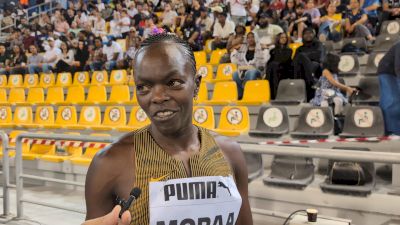 Mary Moraa Wins Doha Diamond League 800m In 1:57, Says She's Looking Forward To Racing Keely Hodgkinson & Athing Mu At Prefontaine Classic
Mary Moraa Wins Doha Diamond League 800m In 1:57, Says She's Looking Forward To Racing Keely Hodgkinson & Athing Mu At Prefontaine ClassicMay 11, 2024
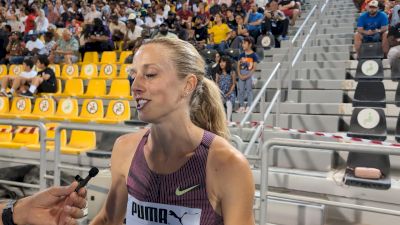 Jemma Reekie Runs 1:58 For Second In 800m At Doha Diamond League 2024
Jemma Reekie Runs 1:58 For Second In 800m At Doha Diamond League 2024May 11, 2024
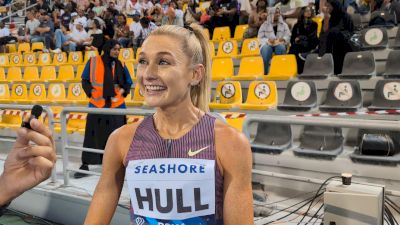 Jessica Hull Clocks 4:00-Flat, Finishes Runner-Up In The 1500m At Doha Diamond League 2024
Jessica Hull Clocks 4:00-Flat, Finishes Runner-Up In The 1500m At Doha Diamond League 2024May 11, 2024
 Diamond League Doha Results: Here's Who Won
Diamond League Doha Results: Here's Who WonMay 11, 2024
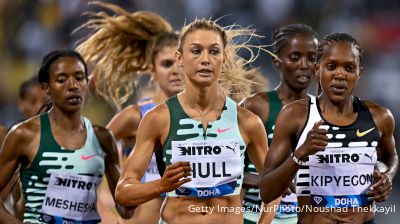 Diamond League Doha 2024 Schedule: What To Know
Diamond League Doha 2024 Schedule: What To KnowMay 9, 2024
 A Look Back On FloTrack x On At 2024 Penn Relays
A Look Back On FloTrack x On At 2024 Penn RelaysMay 9, 2024
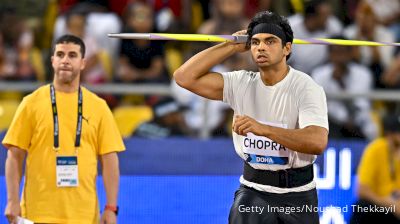 How To Watch The Diamond League Doha 2024
How To Watch The Diamond League Doha 2024May 9, 2024
